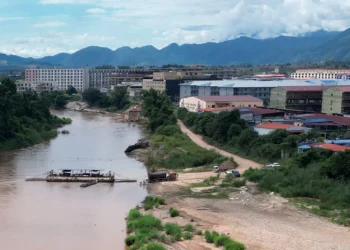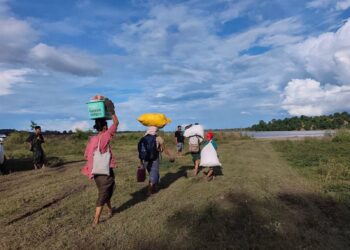On October 13, an anchor for the junta-run MRTV evening news sat rigidly in her chair, as she always does, wearing a pale blue suit while speaking into the camera.
“The National Committee for Determining the Minimum Wage announced on October 9 that, effective as of October 1, workers in Myanmar are eligible for a 1,000 kyat allowance” on top of their daily wages, she said.
The minimum wage committee had initially made the announcement on October 5, but said it only applied to garment workers. Indicative of the regime’s shambolic governance, it quickly rescinded that order and reissued it on October 9, extending it to all workers in companies with 10 or more employees.
The order was meant to assuage demands from labour groups for an overdue review of the minimum wage. The 2013 Minimum Wage Law mandates such a review be conducted at least every two years by a tripartite body that is supposed to include representatives from companies, the government and labour organisations.
The committee last raised the minimum wage from K3,600 to K4,800 per day in 2018. In January 2020, with a review planned for May, labour unions called for another increase, but the labour ministry postponed the process while citing the disruption caused by the COVID-19 pandemic. The following year, with the pandemic still raging, the military seized power. It has yet to review the minimum wage.
In fact, the junta has not even disclosed who now makes up the committee – certainly not now-persecuted labour groups, who say they have no idea who is supposedly representing their interests in such negotiations.
“It is a question we have asked,” said Daw Myo Myo Aye, leader of the Solidarity Trade Unions of Myanmar. STUM was banned after the coup and Myo Myo Aye imprisoned for six months.
“The junta labour ministry has never said how the committee was reformed [after labour groups resigned following the coup]. Who is the committee’s head and who are its members?” she demanded to know.
Rather, the junta has jailed dozens of labour activists and declared many unions and workers’ rights groups illegal. Meanwhile, the junta’s economic policies have led to bank runs, fuel price spikes, runaway inflation and a devalued kyat – leaving the K4,800 minimum wage set in 2018 worth less than ever.
By offering an “allowance”, the committee seemed to be giving the new order the false sheen of a wage hike, while avoiding additional benefits a real pay increase would require – principally, a higher rate for overtime pay.
According to the 1951 Factory Act, which remains in effect, a standard workday is eight hours and any time worked beyond that is paid at an hourly rate that is roughly double the basic wage on a pro-rated basis. The law also caps overtime at 16 hours a week and requires one day off per week.
On the evening broadcast, the anchor introduced Ministry of Labour Permanent Secretary U Nyunt Win to clear up the growing confusion over the new allowance. The screen switched to what looked like a cheap passport photo, unsmiling and staring straight into the camera in a white Nehru collar, before a royal blue backdrop.
“I would like to talk about the minimum wage first,” Nyunt Win’s disembodied voice said.
Then, the permanent secretary said the quiet part out loud.
“This October announcement does not amend the minimum wage. Some may have misunderstood this. What the announcement means is just that there’s an added allowance of K1,000 on top of the minimum wage, which is still K4,800.” If employers calculate overtime based on a K5,800 minimum wage, he said, “they would have to spend too much on workers’ salaries”.
“If the minimum daily wage were K5,800, one hour of overtime would be far more than the K1,200 workers are currently getting. Because of this, we are not amending the minimum wage.”
As he spoke, his photo was replaced by a montage of diligently working women in what appeared to be a brightly-lit garment factory. Some smiled and laughed with their colleagues, happily flipping sheets of cloth on a sewing table.
“We are doing this to balance things between workers and owners,” the permanent secretary said. “Employers shouldn’t be overly burdened, and workers now get an extra allowance.”
Underhanded overtime
Despite Nyunt Win’s clarification, some still feel the regime is being deceptive.
Because the order came from the committee which determines the minimum wage, and because the junta initially described the order as an amendment to the minimum wage, it was meant to appear to workers as if demands for a minimum wage review had been met, even though that is not the case, said Myo Myo Aye.
“If it were merely an extra allowance, the labour ministry should have issued the statement, not the minimum wage committee,” she said, accusing the junta of “colluding” with big business owners.
“Their statement was released just as we began calling for the minimum wage to be raised to K10,000 a day,” she said.
Earlier this year, STUM called for the minimum wage to be raised to K10,000, or about US$4.76 at the junta-set exchange rate of K2,100 to the dollar. The actual market rate, however, is about K3,400, making the STUM demand equivalent to $2.94 a day.
While the minimum wages set in 2015 and 2018 were lower in kyat, they were equivalent to between $3 and $4 a day, said Daw Moe Sandar Myint, chair of the New Light Federation of Labor Unions Myanmar.
“Commodity prices are now [multiple] times what they were in 2018, so the wages workers are currently getting are not even close to being enough to live on,” she said. “They need a living wage that matches current levels of inflation.”
Each of the eight workers Frontier was able to speak with agreed.
“A dozen eggs used to cost about K1,000. Now, K1,000 buys just four eggs, and a pyi of rice costs K6,000,” said Ma Cherry*, referring to a local measure that amounts to about two kilograms. “Our wages don’t even cover a pyi of rice!”
In another familiar trick, Ma Cherry said her dormitory landlord in Yangon’s Shwepyithar Township raised the rent from K55,000 per month to K65,000 after the new allowance went into effect, eating into her margins.
With workers swimming against the tide, overtime pay is no fringe benefit. Many depend on it to make ends meet, and in recent years there have been widespread reports of workers being illegally forced to work long overtime shifts – and not always being compensated accordingly. Several international clothing brands such as H&M and Inditex have said they would stop sourcing from the country over that and other abuses.
Ma Cho*, a former garment worker at the Hunter Textile Co factory in Yangon’s industrial suburb of Hlaing Tharyar, said she was made to do gruelling overtime shifts when large orders came in, but was cheated on overtime wages.
Last month, during one such shift, she began to feel a painful cramp in her stomach, followed by vaginal bleeding.
“I told my supervisor I was suffering and asked what they could do, but the factory doesn’t offer or arrange any kind of medical care,” she told Frontier. “When I asked to go to a nearby clinic, it took several hours for them to give me a gate pass to leave the compound.”
Ma Cho was four months pregnant at the time. By the time she reached the clinic, she’d miscarried. Afterwards, she was hospitalised for three days. She said the Hunter Textile factory refused to grant her sick leave, firing her instead for missing work.
Ma Ei, joint secretary of the Federation of General Workers Myanmar, said the federation has received multiple reports of labour rights abuses from this factory. Like several other leading members of the FGWM, Mai Ei fled the country after the 2021 coup, but many of its member unions continue to operate under the radar in Myanmar, recording rights violations.
She said the reports from Hunter Textile described employees being made to work from 7:30am until 4am the following day, with systematic under-counting of overtime pay and prohibitions on voicing complaints during working hours.
“In that factory, workers don’t have the right to question their line supervisors about what is right or wrong,” Ma Ei said. “When a worker voices a complaint, they receive a warning, and after three warnings, they’re fired without compensation.”
In November, with complaints in hand, the federation began reaching out to the company and its buyers.
“We learned that it’s owned by a Chinese national and its partner is the Italian brand OVS, so we contacted them,” but have yet to hear back, she said.
When Frontier called the phone number listed on the Myanmar Garment Manufacturers Association website for Hunter Textile, the line was inactive.
OVS confirmed to Frontier that Hunter is one of its suppliers, but said that in addition to regular audits of its suppliers, the company also runs a programme which allows workers to report rights abuses directly to them through a mobile app.
“So far we haven’t received any warnings from the workers and the reports from third party auditors do not show the circumstances that you reported to us,” OVS representative Ms Camilla Mirone told Frontier. “However, we take [these allegations] into serious consideration … and we will start a further dedicated verification.”
Still, labour activists say, the problem is bigger than any single factory, and a lack of legal awareness among workers has prevented more cases from coming to light. “Many workers don’t know their rights are being violated and are content with a minor pay increase,” said Ma Ei.
Meanwhile, rising poverty and a lack of employment options leave workers with little choice but to keep showing up at the factory gates. Every morning at around 7am, with the sun still rising over Bogyoke Aung San Road in Hlaing Tharyar, thousands of young, mostly female workers surge east like an ocean current. Traffic lights turn from red to green, and streams of exhaust-belching trucks lurch forward, before disgorging even more workers.
Some walk briskly, but most move at a half-sprint. Workdays at most factories begin promptly at 7:30am, by which time this great tide of dawn travellers will have vanished from the street.
“If you come here around 8am or 9am, you won’t see anyone,” a street vendor told Frontier one morning in December. “From 6am to 7am, the roads are flooded with workers and their ferry-trucks; at 7:30, the streets are silent. You don’t see anyone until the evening, when the factories release them.”
“Their working lives are like those of a prisoner,” he said. “The factory doors don’t open at all until they’re dismissed.”
*indicates the use of a pseudonym for security reasons
Correction: This article has been amended to clarify that while several leading members of the Federation of General Workers Myanmar are now in exile, many of its member unions continue to operate in Myanmar under the radar.
SOURCE – FRONTIER






